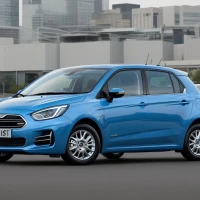Which Year Models of Used Toyota Prius to Avoid: Expert Guide to Smart Buys
Shopping for a used Toyota Prius and want to avoid a costly mistake? Discover which year models you should steer clear of and save yourself from headaches and repair bills. Our expert guide dives deep into the common pitfalls and hidden issues of certain Prius models, ensuring you make a smart and savvy investment. Get ready to feel confident about your next car purchase!
Quick Answer: Avoid Toyota Prius Year Models 2005, 2006, 2007, 2008, 2009, 2010, 2011, 2012, and 2016

Choosing the right used Toyota Prius requires careful consideration, as some model years are known to have reliability issues. Quick answer: avoid Toyota Prius year models 2005, 2006, 2007, 2008, 2009, 2010, 2011, 2012, and 2016. These years are often flagged for various mechanical and electronic problems that can be costly and troublesome to fix. Models from 2005 to 2009 often suffer from battery degradation, reducing the hybrid system’s efficiency and lifespan. The 2010 to 2012 models have been reported with common issues in the ABS system and evaporative emission control. Additionally, the 2016 model year has been noted for problems related to the engine and electrical system, causing potential headaches for owners.
By steering clear of these particular years, you reduce the risk of encountering persistent mechanical failures. Instead, consider later models like those from 2013 to 2015 which show higher reliability or look into 2017 and newer models with fewer reported issues. Comprehensive research and consultation with dealers and current owners can also provide valuable insight into making a smart purchase. Being informed about which year models to avoid ensures that your investment in a used Toyota Prius will offer the reliability and efficiency that the Toyota brand is famed for.
Which Year Models of Toyota Prius are Safe to Buy Used?

When purchasing a used Toyota Prius, it’s essential to know which year models are best avoided and which are safe bets to avoid potential issues down the road. While the Prius is renowned for its fuel efficiency and reliability, some years have reported higher incidences of problems, making research crucial.
For prospective buyers asking, “Which Year Models of Toyota Prius are Safe to Buy Used?”, focus on models post-2011. The 2010 Prius, for example, experienced several complaints regarding its brake performance and excessive oil consumption. Additionally, Prius models from 2007 to 2009 reported frequent issues with the hybrid battery, which could be costly to replace.
Conversely, the 2012 and newer models have consistently improved in terms of technology, reliability, and overall performance, making them a more reliable choice for used car buyers. These models, particularly from 2015 onward, benefit from enhancements in fuel economy, updated safety features, and fewer recorded mechanical problems.
In summary, thorough research can guide you in determining “Which Year Models of Toyota Prius are Safe to Buy Used?” Focusing on newer models will generally yield a more dependable and satisfying purchase, ensuring your investment stands the test of time.
Which Year Models of Toyota Prius to Avoid:

Navigating the used car market can be challenging, especially when it comes to hybrid vehicles like the Toyota Prius. This expert guide aims to highlight which year models of Toyota Prius to avoid in order to help you make smart, well-informed purchasing decisions. Despite its reputation for reliability and fuel efficiency, not every model year is free from flaws. Knowing which year models of Toyota Prius to avoid can save you from future headaches.
The 2010 model, for example, has a well-documented issue with excessive oil consumption that has frustrated many owners. Another problematic year is 2007; the battery life tends to degrade quicker, resulting in potentially costly replacements. The 2008 model also has its share of troubles, primarily with brake actuator failures that can lead to unsafe driving conditions.
In recent years, the 2016 model has faced criticism due to its less-than-impressive build quality and unreliable braking system. Similarly, the 2014 Toyota Prius has been reported to have issues with its electrical system, making it another year to consider avoiding. By focusing on which year models of Toyota Prius to avoid, you can steer clear of these problematic vehicles and enjoy the dependability that the Prius brand is known for.
Common Toyota Prius Problems

When considering a used Toyota Prius, an expert guide to smart buys can be invaluable for avoiding potential pitfalls. Common Toyota Prius problems are often associated with specific year models that prospective buyers should approach with caution. Notably, the 2010-2012 models are infamous for oil consumption issues, which can lead to more frequent maintenance and costly repairs down the line. These years also face potential problems with the brake actuator system, an essential component for the car’s regenerative braking and overall safety.
Another model to be wary of is the 2010 Prius, which often exhibits engine and head gasket problems. Failing to address these issues promptly can result in severe engine damage and significant repair expenses. The 2007-2009 Prius models are also known to experience faults with the hybrid battery, a crucial part of the vehicle that can be expensive to replace.
Paying attention to these common Toyota Prius problems can help you make a more informed decision and ensure that your investment in a used hybrid vehicle pays off in the long run. By avoiding problematic year models, you can enjoy the benefits of owning a reliable, fuel-efficient Toyota Prius without the hassle of unexpected repairs.
Toyota Prius problem counts by year

When considering a used Toyota Prius, it’s crucial to pinpoint which year models to avoid, focusing on Toyota Prius problem counts by year. This data helps aspiring buyers make informed decisions, steering clear of problematic editions. Generally, the Prius is renowned for its reliability, but certain years have shown consistent issues.
The 2010 Toyota Prius, for example, is well-documented for its excessive oil consumption and brake problems. Similarly, consumers should be cautious with models from 2007 to 2009, as these have reported faults with their headlight assemblies, often requiring costly repairs. The 2011 and 2012 Prius models also draw attention, primarily due to concerns with the inverter system that manages the hybrid drivetrain. Additionally, issues with the electric water pump have frequently been noted in 2013 models.
By understanding Toyota Prius problem counts by year, savvy buyers can dodge these troublesome models and focus on more dependable vintages. This approach not only ensures a smoother ownership experience but also helps maintain a favorable resale value. Always consult trusted resources, such as consumer reviews and reliability studies, before making a purchase. By staying informed, you can enjoy the benefits of driving a well-regarded, fuel-efficient vehicle without inheriting someone else’s headaches.
FAQs: Used Toyota Prius Years to Avoid

When considering which year models of used Toyota Prius to avoid, expert advice can be invaluable. Although the Toyota Prius is renowned for its reliability and fuel economy, not all model years share the same level of dependability. Certain years have been flagged for having more consistent issues than others. This guide will help you navigate the complexities of purchasing a used Prius and avoid common pitfalls.
One commonly asked question is, “What problems should I be aware of?” By focusing on FAQs: Used Toyota Prius Years to Avoid, we’re able to provide targeted information. The 2007-2009 models, for example, have been noted for high battery failure rates and problematic headlight systems. The 2010 model year, part of the third-generation Prius, has also drawn attention for its oil consumption issues and engine problems.
Understanding these weak points allows you to make a more informed decision when shopping for a used Prius. Instead of being mesmerized by newer features, concentrate on reliability metrics and user reviews. Utilizing guides and FAQs: Used Toyota Prius Years to Avoid can steer you clear of costly repairs and ensure your investment is sound. Remember, a well-informed buyer is a smart buyer.
The Easiest Way to Find a Reliable Toyota Prius In Your Area

When shopping for a used Toyota Prius, it’s crucial to be discerning about which year models to avoid to ensure a satisfying purchase. Generally, the 2007 and 2010 models have reported more frequent issues such as excessive oil consumption and electrical problems. 2007 models, in particular, often exhibit battery failures, which can be costly to repair. Similarly, the 2010 model faced complaints about brake problems and a recurring “Check Hybrid System” light. However, knowing which models to steer clear of isn’t enough. The easiest way to find a reliable Toyota Prius in your area involves a combination of research and expert guidance.
Start by utilizing online resources like consumer reports and forums focused on hybrid vehicles. Additionally, reaching out to local automotive experts can offer valuable insights into the best options available near you. Carfax reports and vehicle history checks are indispensable tools in narrowing down your choices to the most dependable models. By focusing on these steps, you’ll significantly increase your chances of finding a reliable Toyota Prius that matches your needs and budget. Following these guidelines is the easiest way to find a reliable Toyota Prius in your area, ensuring a smart buy that delivers lasting satisfaction.
Used Prius for sale near me

Navigating the market for a reliable hybrid vehicle can be challenging, especially when seeking a used Prius for sale near me. While the Toyota Prius is renowned for its dependability and fuel efficiency, certain model years come with known issues that are better avoided to ensure a smart buy. Experts caution against the 2010 and 2011 models due to concerns about excessive oil consumption and engine reliability. Additionally, some 2007 models have encountered significant electrical problems, impacting the overall driving experience and safety. When searching for a used Prius for sale near me, it’s wise to focus on later models like 2015 and onwards, which have fewer reported issues and benefit from Toyota’s continuous improvements. Always consider having a trusted mechanic thoroughly inspect any used vehicle to verify its condition. Doing so can prevent unexpected repairs and ensure that your investment is sound. Shopping wisely and avoiding problematic year models will allow you to enjoy all the advantages that come with owning a Prius, such as lower emissions and excellent fuel economy. By being vigilant and informed, finding the perfect used Prius for sale near me becomes a straightforward and satisfying endeavor.










